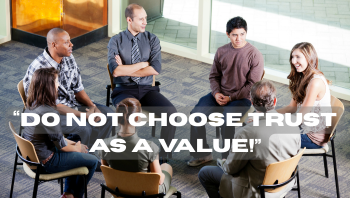Why psychological safety is the value that really drives teams forward!
Do you want to include “trust” as one of your core values because it is important for implementing your strategy? Choose another one instead!
When we talk about the values that hold a team together and drive it forward, “trust” almost always comes up. Trust is seen as the basis, the foundation of any collaboration. And yes, trust is important – but let's be bold for a moment and think about whether it's really enough.
Here's the key point: the two terms are related but mean different things: trust alone works in a relationship between two people. Psychological safety, on the other hand, works for the entire team.
Why trust is not enough
Trust means: “I believe that you are reliable. I believe that you do your job well.” It is a quality that binds two people together. But what happens in a team in which there is trust between individual members, but not everyone dares to speak up in the team? What happens when someone is afraid of asking a supposedly “stupid question” or admitting a mistake?
Trust is of little help here. Because trust can be quiet, private – psychological safety means visible cooperation in a team, it is loud and public. It creates an atmosphere in which everyone finds the courage to say what they really think.
What psychological safety does differently
Psychological safety is the value that creates space for courage, creativity and real growth in a team:
- Innovation requires risk. Without psychological safety, ideas remain unexpressed because no one wants to take the risk of being rejected or “sticking out”.
- Mistakes are part of learning. Psychological safety ensures that we see mistakes as opportunities, not as threats. Trust may help here – but only psychological safety as a team value ensures that no one is afraid of consequences.
- The whole is greater than the sum of its parts. Psychological safety not only strengthens individual relationships, but also the overall dynamics of a group. It makes the team stronger than any dyadic relationship could.
The counterargument – and why it is not enough
You could say: “But if we promote trust, we are creating a good basis for psychological safety!” That's true – but it's not enough. Trust is one component, one building block. When there are conflicts in the team, “trust” means that these are addressed between people who trust each other – and often outside of team meetings.
However, if a team has a high level of psychological safety, these conflicts are addressed directly and in the presence of all team members and, in the best case, resolved.
Psychological safety is the space in which teams can really grow because it is not dependent on existing relationships. Psychological safety makes teams independent of the chemistry of individuals. It always works – even in heterogeneous, diverse or newly formed groups.
So why should we choose psychological safety?
When we promote trust, we are saying, “It's important that you can rely on me.” When we promote psychological safety, we are saying, “It's important to all of us in the team that you can be yourself – no matter what.”
That's what really counts: a team in which everyone has the space to grow, to take risks together and to be courageous.
We appeal: let's set an example. Let's not choose the familiar path of trust as a value. Let's choose the courageous path of psychological safety. Because only in this way can we create teams that not only feel good, but also achieve great things.
And now?
In the next two blogs, we will formulate ideas on how you can promote and develop psychological safety in your team and systemically.


About me

All Rights Reserved
Get in touch
-
+49-(0)941 600 93 003
-
This email address is being protected from spambots. You need JavaScript enabled to view it. -
Thomas_Huber
ToChange Gmbh
-
Thomas Huber
-
Traubengasse 6
-
D-93059 Regensburg

